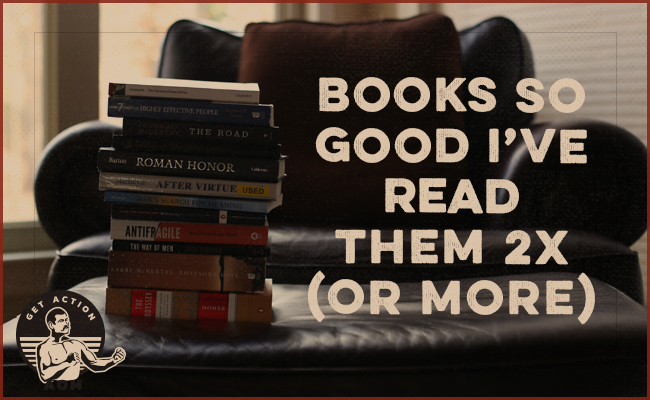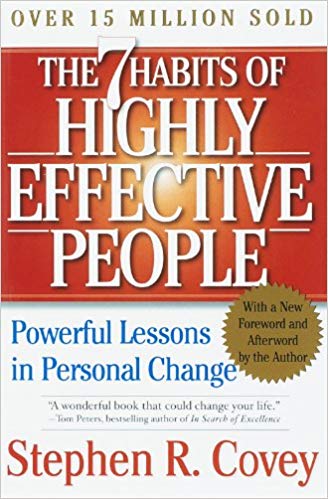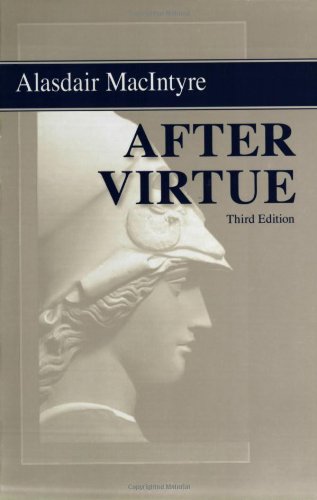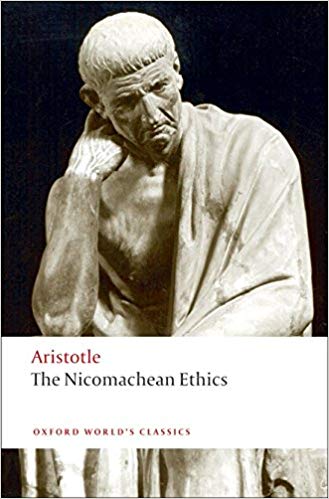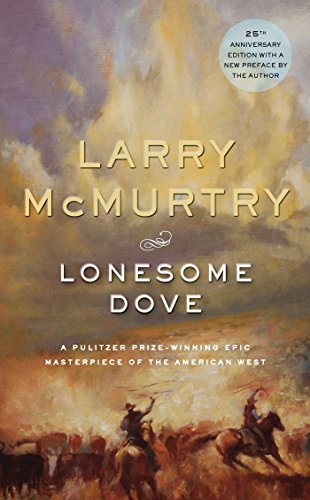Given the fact that there are over 130 million books in existence, it’s easy to despair of ever having the chance to read even the smallest fraction of them. And given how little headway you’ll ultimately make on that number, even if you’re a regular reader and live to a ripe old age, it can be hard to justify reading the same book, not just once, but twice (and even multiple times!).
But I think there are several good reasons to do so.
The first is that each time you read the same book, you come away with new insights. You get different things out of a book when you read it at 36 than you did at 16 (and you’ll find different things at age 76, too).
Second, even when you’ve learned and affirmed the principles of a personal development or philosophical-type book, you have to revisit them regularly to keep them at the forefront of your mind. Humans are slothful, forgetful creatures; even when a book’s insights initially made your spirit soar and unlocked a new dimension in your thinking, without regular reminders, you’ll be taking them for granted in a very short time!
Third, sometimes re-reading the same book can become a special tradition (e.g., you look forward to re-reading A Christmas Carol every December), and even a cathartic ritual (see my note about The Road below). When you read the same thing on a cyclical basis, you find that rather than suffering “the horror of the Same Old Thing,†the practice can actually help you overcome it.
Finally, favorite fiction books become like old friends. When you open one up, you feel like you’re reconnecting with a beloved cast of characters who you’ve missed and are glad to be reacquainted with all over again.
Plus, few of the millions of books you could be reading for the first time are any good — and it can be more beneficial to re-read quality than to read mediocre slop anew! (I read 125+ new books a year in addition to my perennial favorites, so it’s not an either/or equation; as I know someone will ask, I have to read so many books for my work on the Art of Manliness, but you can read, or re-read more books too, using the tips I’ve outlined here.)
Below you’ll find a list of some of the books I’ve re-read at least twice, and often many times more. While I read books for both work and pleasure, and many of the books below I’ve read for both, I only re-read the books that have provided fodder for articles, that have also given me personal enjoyment.
The Seven Habits of Highly Effective People by Stephen Covey
I first read The Seven Habits of Highly of Effective People back in high school and was blown away by Covey’s ability to create fresh, compelling angles on common sense principles — put first things first; begin with the end in mind — and show how they can be implemented to create a flourishing life. Since then, I’ve re-read The Seven Habits every few years to remind myself of these important fundamentals that I already know, but that are so easy to lose sight of.
For my distillation and take on the 7 habits, read this series that covers each one. Also listen to my podcast with Stephen’s son.
The Great Gatsby by F. Scott Fitzgerald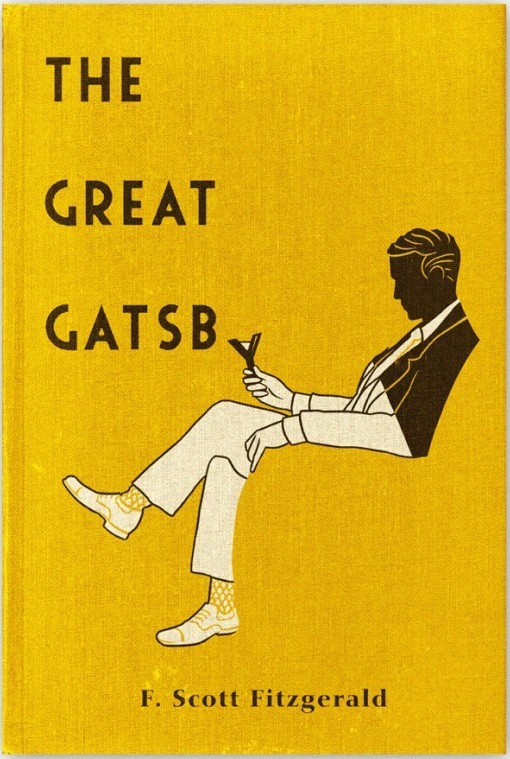
The first time I read F. Scott Fitzgerald’s Great American Novel, I was a sophomore in high school. But it didn’t really resonate with me then. That changed when I took a class in college called “American History Through the American Novel†with Professor Danney Goble. He made that book come alive for me by subtly illuminating its rich metaphors and highlighting Fitzgerald’s superb style. Since then, while I haven’t read The Great Gatsby as many times as literary critic Maureen Corrigan (who’s read it 67 times; you can listen to my podcast interview with her about that here), I have re-read it so many times I’ve lost count of the number. And every time I re-read it, I uncover a new symbol or metaphor that I never noticed before, and welcome the chance the re-contemplate the theme of wanting vs. liking. This book never gets old.
The Road by Cormac McCarthy
The Road has been called by some a love story between father and son, and nothing could better describe it. The book powerfully puts the beauty and sorrow of fatherhood in stark perspective, revealing paternal love intensely close to the bone.
The first time I started it, I read it all in a single flight coming home from a vacation. While I didn’t have kids at the time, and was surrounded by strangers, I was blubbering like a baby by the time the wheels hit the tarmac in Tulsa.
When Gus was born, I decided to re-read The Road again since I figured it would have more meaning now that I was a dad. Indeed, it made me cry even harder the second time. Since then, I’ve made it a personal tradition to read The Road once a year. It’s a cathartic ritual: I read it, cry as my heart gets squeezed in a vise of emotion, and then hug and kiss my kids while they wonder what’s wrong with Dad.
The Road makes me re-evaluate how I’m doing as a father. It forces me to ask if I’m preparing my kids so they can survive without me — not only physically, but spiritually.
It forces me to ask myself “Am I teaching my children to carry the fire?â€
As the answer is always, “I could do a little better,†it’s a question worth reflecting on annually.
After Virtue by Alasdair MacIntyre
In After Virtue, Scottish philosopher Alasdair MacIntyre argues that we’ve lost the idea of having a telos — an ultimate aim — as well as the language needed to talk about the virtues required to achieve it. One of the results is that our discourse on morality has become increasingly shrill.
After Virtue is a really hard book to read and fully understand, but it’s the enjoyable kind of hard. When you put in the effort to grasp what MacIntyre is arguing, you’re rewarded with fresh insights about our current age. And because he’s writing about such a broad and deep topic, every time I read After Virtue, I walk away with some new idea to contemplate.
The Odyssey by Homer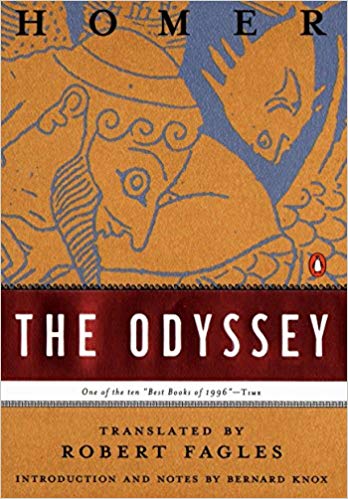
I’ve read Homer’s The Iliad multiple times, but I did so for school and work. It’s mighty good, but it doesn’t grasp me by the heartstrings. It’s a different, ahem, story with The Odyssey, which I’ve read dozens of times for pure pleasure. There are a couple of reasons I turn to one of these ancient tales much more than the other.
First, The Odyssey is just a grade A adventure story. Just a plain fun book to read.
Second, and more importantly, the character of Odysseus is a lot more relatable than Achilles. Achilles is a demigod; Odysseus is fully mortal. Achilles doesn’t seem to miss his family, of whom we learn little about; Odysseus just wants to get back to his family — in fact, he gives up spending eternity with an ageless sex nymph so he can return to his mortal wife Penelope. Achilles only wants glory; Odysseus wants that too, but he wants to survive and make it back home more.
A mortal dude who’s just trying to survive in a crazy, topsy-turvy world so he can spend time with his family? I can relate to that.
The book has taken on different meanings for me when I read it after getting married, after having kids, and now that I’m approaching middle age.
Antifragile by Nassim Nicholas Taleb
Nassim Nicholas Taleb is a former trader and current intellectual provocateur (see his Twitter and Medium accounts) who writes about philosophy and probability. He’s the guy that popularized the idea of “Black Swan†events in history. Wikipedia succinctly describes a Black Swan event as one “that comes as a surprise, has a major effect, and is often inappropriately rationalized after the fact with the benefit of hindsight.†The Great Depression. The Great Recession. Both World Wars. These are examples of Black Swan events.
In his book Antifragile, Taleb offers heuristics for businesses and individuals on how to not only survive a Black Swan, but thrive in it.
I’ve read all of Taleb’s books and they’re all great, but Antifragile is the one that I go back to over and over again. Taleb’s ideas are often counterintuitive and iconoclastic, but he makes great cases for them. I think the biggest reason I keep re-reading Antifragile, though, is that it’s just so damn fun to read. Taleb’s pugnacious and doesn’t suffer fools. The literary punches he throws at those he deems “imbeciles†not only crack me up, but the way he presents his ideas as a debate between a street smart spokesman (Fat Tony) and his traditionally smart, yet clueless rival (Dr. John), helps make the ideas more understandable. I also enjoy the occasional digressions he takes throughout the book. They’re fun, and always illuminating.
Nicomachean Ethics by Aristotle
Thanks to famous entrepreneurs and digital influencers, Stoicism has become the ancient philosophy of choice for many young people today. But there’s an ancient philosophy that I think is even more useful and life affirming than Stoicism: Aristotelian virtue ethics. I think part of the reason Stoicism is seen as the “cool†philosophy and Aristotelian virtue gets overlooked is that Aristotle’s writing doesn’t really have any pithy, quotable maxims like the writing of the Stoics does. But it’s richly rewarding for those who dig into it.
Aristotle’s answer to the question how to live a good life is “it depends.†In his Nicomachean Ethics, he lays out how to live a life of eudaimonia, or flourishing. It requires a person to use their practical wisdom to figure out what the right thing to do is in whatever situation they find themselves in. There are no iron-clad rules, which makes deciding how to act more challenging, but I think more wise.
Should you get angry at a business rival who copied your idea? The Stoics would say “Don’t get angry because that disrupts tranquility and could lead to poor decisions.†Aristotle would say “Well, maybe you should get angry because it’s just to do so, it will spur you to take action, and if the rival is directly confronted, he’ll back down. Or maybe in this particular instance, direct confrontation will end up damaging you and it’s better to hide your emotions and quietly best the rival from behind the scenes. Use your judgement.â€
I love Aristotle because he understood that life is complex and there is no one right answer for the situations we find ourselves in. His Nicomachean Ethics provides a flexible framework for navigating these complexities, which is why I’ve re-read it multiple times.
Roman Honor by Carlin Barton
Roman Honor is a book quite unlike any other I’ve read. It’s one part history, one part philosophy, and one part insight into the modern age. Altogether it adds up to quite possibly the most interesting and incisive book I’ve come across. Even the footnotes are utterly fascinating.
Barton traces the way Rome’s honor culture dissolved as it moved from a Republic to an Empire, and how its original definition of dishonor transformed into the new definition of honor along the way. That is, whereas Rome’s traditional honor culture elevated being fiery, passionate, thin-skinned, and competitive, and disdained being independent, immovable, and callous — someone who didn’t care what anyone else thought and was literally shameless — honor in the Empire became the exact reverse, where only personal integrity mattered, having a rock-like disposition was celebrated, and the philosophy of Stoicism rose in popularity. It’s a fascinating lens by which to see how the same factors that led to the dissolution of traditional honor and the rise of Stoicism in Rome, have led to parallel trends in our own time.
The book has greatly influenced my perspective on the world, and I’ve re-read it multiple times both for pleasure and for work; I’ve gotten more than half a dozen article ideas from it, and as we’ve only covered a couple so far, look out for more in the years to come!
The Way of Men by Jack Donovan
I’ve read a lot of books about the anthropology, psychology, and biology of manhood written by top rate experts in their field. The Way of Men by Jack Donovan distills all of that into a highly potent and highly readable ode to sweaty, muscular masculinity. Do I entirely agree with the philosophy of manhood laid out in the book? Nope, which is why I like re-reading it so much. The Way of Men challenges your assumptions and makes you think hard about what it means to be a man.
While media pundits, and academics, and pop culture influencers debate and endlessly dither on about what it really means to be a man, and a hundred disparate definitions of manhood get thrown around, this book cuts through the noise to locate the central core of masculinity.
Meditations by Marcus Aurelius
Just because I’m not all-in on Stoicism and have some critiques of the philosophy, certainly doesn’t mean that I find nothing redeemable or useful about it. While I don’t think the philosophy is one you should center your whole life around (I think Aristotelianism is better suited to that purpose), I do think it is extremely useful, and even indispensable, when strategically employed as a tool in certain situations. I see Stoicism as proto-cognitive behavioral therapy — a way to challenge incorrect, detrimental thinking about the world, and to find peace in circumstances you truly can’t control.
My favorite book of Stoic philosophy is Meditations by the Roman Emperor Marcus Aurelius. It’s short so it lends itself well to re-reading, and it’s packed with pithy maxims you can use as practical heuristics in navigating life. And because the book is basically Aurelius’ private journal, Meditations gives you a firsthand look at a prominent figure in history trying his damndest to be stoic and grappling with the tensions that come with seeking to mold your life to an ideal.
Man’s Search for Meaning by Viktor Frankl
I read Man’s Search for Meaning after seeing a reference to it in The Seven Habits of Highly Effective People. I was 16 or 17 years old. This book blew me away the first time I read it and was my gateway into existential philosophy. I printed off quotes from this book, framed them, and gave them as gifts to friends.
The big takeaway from Man’s Search for Meaning is arguably life’s most important lesson: there is one freedom that no one can ever take away from you, and that’s the freedom to choose how to respond in any given circumstance. If a man can choose to be happy while imprisoned in a concentration camp, as Frankl did and was, then a man can choose to be happy in any situation. This radical autonomy is what makes us human.
I’ll re-read this book whenever I feel helpless and need a reminder that I do in fact have control over my life.
Lonesome Dove by Larry McMurtry
Lonesome Dove is the greatest cowboy story ever told, and my hands-down favorite book of all time. It’s the American Odyssey. The story follows two long-time friends on a cattle drive from the Rio Grande to Montana. Along the way they encounter outlaws, Indians, and old flames. I love this book so much, I even named my son Gus after one of the protagonists, Gus McCrae.
Despite being over 700 pages long, I’ve read this book four times in the past 10 years or so. It never gets old. Each time I start it again, it feels like I’m catching up with old friends. I still laugh out loud and cry at the same parts.
Are there lessons on life from Lonesome Dove? Sure, but I can’t say I re-read it for them. I read it over and over again because I like it. A whole heck of a lot.
Click here for more of AoM’s book lists and reading recommendations.
Tags: Books

